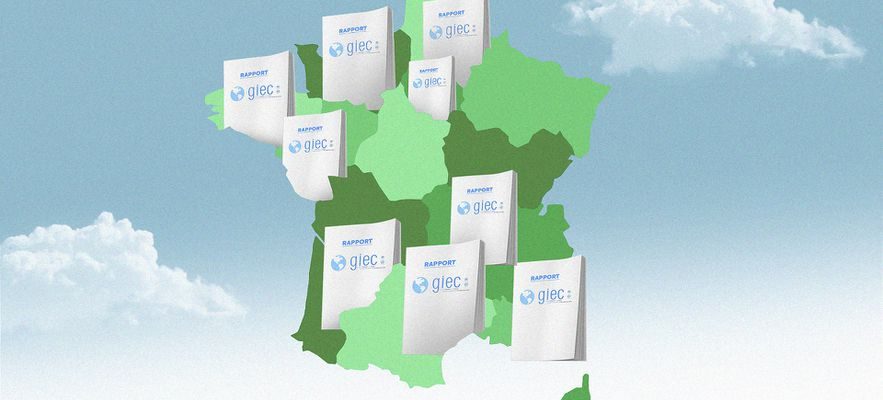A cycle has ended. The Intergovernmental Panel on Climate Change (IPCC) released a summary of the three parts of its 6th report on 20 March. Since 2015, he has compiled thousands of pages of the state of scientific knowledge on global warming. While some experts are questioning the interest of continuing to publish until the next evaluation cycle – around 2030 – the essentials are now known. After the screenings, it’s time for action. But how to transpose this planetary knowledge to the local levels? How to implement effective policies in a France divided between plains, mountains and coasts; between cities and countryside?
“Reading the IPCC summary is not enough”, agrees Laurent Delcayrou, head of the “Territorial Resilience Strategy” project of the Shift Project, a think tank specializing in decarbonization issues. Few elected officials, moreover, have gone through all of the – or even one – of the reports. The information is dense, technical. Especially very global. “The local, for the IPCC, is on the scale of a continent or a nation-state”, illustrates the researcher François Bertrand, from the University of Tours. At the sight of a municipality or a region, the spectrum is inhibiting. Where to start ? “There is a gap between the knowledge produced by scientists and the knowledge necessary for action, analyzes the one who is also a regional planning adviser to the president of the Centre-Val de Loire region. “There is a real work of translation of the knowledge to be achieved. It’s a job in its own right.”
“The melting of the sea ice, it does not speak in Normandy”
To do this, initiatives and structures have flourished in recent years. The Shift Project, for example, has set up a program, with production of separate reports and notebooks for six types of territories in order to support elected officials in France. “We come back to very concrete things about climate change, by illustrating the territorial specificities of the issues. The idea is that people recognize their environment”, explains Laurent Delcayrou.
Eleven French regions out of 14 have their own “IPCC”.
© / Istock – L’Express
Decline, refine, it is also the ambition of the “regional IPCC” – said Greek, the “r” for regional. They have multiplied (Brittany and Pays-de-la Loire are the latest, 11 out of 14 regions have them) under different legal statuses and names. They do not all work in the same way but share the same objective: “to summarize what exists on climate change at the scale of a region”, describes Benoît Laignel.
The professor of geosciences and environment at the University of Rouen Normandy, of which he is vice-president, knows the subject well. He combines the hats: author of the Giec, co-president of the “Norman IPCC” and president of the “local Giec” of the metropolis of Rouen. And therefore has a complete vision of the task to be carried out to adapt the discourse according to regional characteristics. “You have to lead by example. The melting of the ice floe does not speak in Normandy. But the consequences on the coast yes. Those on fishing, shellfish farming too. Same for the risks of flooding on the axis Seine, where many Seveso-classified factories are located”, Benoît Laignel list.
“Getting out of a centralized model”
Floods are also a risk for the Rouen metropolis, to which is added the problem of heat islands. As in all urban areas elsewhere. In New Aquitaine, coastal erosion is monitored as much as threats affecting agriculture or the Pyrenees chain… “We support and guide on issues that will be different depending on the locality”, describes Yohana Cabaret, project manager To AcclimaTerrathe pioneer of “regional IPCC” born in 2010.
These entities multiply information meetings with elected officials “who are not all aware of the levers in their hands”, notes Laurent Delcayrou, of the Shift Project. Most, according to the experts interviewed, are now lucid about the situation and the local impacts – the drought of last summer marked the spirits. But the move to action is still variable and limited, due to a lack of human and financial resources or a vision beyond the mandate. The problem of the French administrative mille-feuille comes up regularly. That of a lack of coordination too. “We see a lot of disorderly responses – which can sometimes be effective. But the role of the region is to have a global strategy for adapting to climate change”, points out François Bertrand, who is campaigning for the creation of a “regional IPCC ” in the Centre-Val de Loire.
The existing structures already exchange with each other. If, until now, the dialogue revolved for many around the best way to constitute its “regional IPCC”, it focuses more and more “substantive subjects. The idea is to have a common speech”, illuminates Yohana Cabaret. This is an opportunity “to get out of a centralized model, not to be only in a top-down approach”, abounds Laurent Delcayrou. The agricultural engineer, an economist by training, however, warns of three pitfalls. “We must not reduce the subject to a climate issue and forget the other aspects – biodiversity in particular. Do not be in techno-solutionism. And do not simply think about our territory. We must be united: our fates are linked.”
